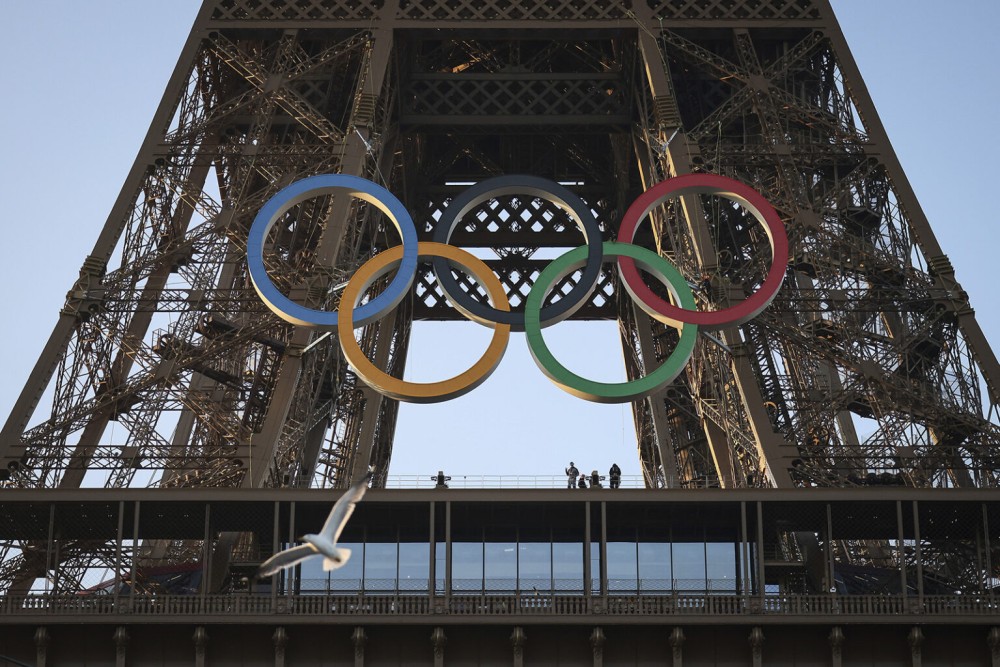Amnesty International report condemns France's hijab ban for its Olympic athletes

The Olympic rings are mounted on the Eiffel Tower on June 7. (AP Photo/Thomas Padilla, File)
In the lead up to the Olympics and Paralympics Summer Games of 2024 in Paris, Amnesty International published a damning report on the host country’s decision to bar its athletes from wearing a hijab while competing during the games.
The report, released July 16, aims to draw international attention to what it considers violations of Muslim women’s and girls’ human rights. It also casts a critical eye on France’s “discriminatory policies against Muslim women” in sports and society, promulgated in the name of “laïcité,” or secularism, which demands religious neutrality in public spaces.
French Minister of Sports Amélie Oudéa-Castéra announced in September 2023 that while female athletes from other countries could cover their heads, France would bar its delegation from wearing headscarves during the competition. The announcement provoked an uproar among human rights organizations.
“No one should impose on a woman what she needs to wear or not wear,” commented the UN Human Rights Office through its spokesperson, Marta Hurtado.
Anna Błuś, a researcher for Amnesty International who helped produce the report, said France’s efforts to organize the “first ever gender-equal Olympics” are meaningless if the country continues to discriminate against its own Muslim athletes.
“We find this very hypocritical to say that you care about women’s equality and women’s participation in sports while at the same time effectively banning Muslim women who wear hijab and other forms of religious clothing from participating in these games,” she said.
According to Amnesty’s report, France’s decision violates the Olympics’s fundamental principles and in addition breaches the International Covenant on Civil and Political Rights, the International Covenant on Economic, Social, and Cultural Rights, introduced by the UN, as well as the International Convention on the Elimination of All Forms of Racial Discrimination.
The ban also violates the provisions of the International Olympic Committee’s human rights framework. In a letter to the IOC’s president in May, Amnesty International and nine other organizations advocating for human rights in sports urged the committee to overturn the ban.
“The hijab bans in sports have resulted in many Muslim athletes being discriminated against, invisibilised, excluded and humiliated, causing trauma and social isolation—some have left or are considering leaving the country to seek playing opportunities elsewhere,” read the letter.
In June, the IOC responded by noting that the ban only applied to French athletes, who are considered civil servants. The committee guaranteed that all other athletes would have the right to wear a hijab and other religious signs in the Olympic Village, Olympic venues, and in competition, in accordance with their country’s Olympic federations’ policies.
Błuś said this was a feeble response, saying the IOC could have pressured France to overturn the ban, especially as it is currently considering the country’s application to host the Winter Olympics of 2030.
“They are just washing their hands and saying France has the right to do this. This is not true. It’s very disappointing and very weak,” she said.
While the French ban is in line with similar rules enforced by the country’s other sports federations, the report argues that the Olympics weaponizes laïcité by imposing restrictions disproportionately affecting Muslim women. In its report, Amnesty International compared the clothing and equipment rules of the French federations of volleyball, football, and basketball to those of 38 European countries.
It revealed a “jarring exception on the map of Europe” and notes that “no other country in the region, at the level of national laws or individual sports regulation, has enshrined bans on religious headwear such as those worn by some Muslim sportswomen and girls.”
This difference with European countries stems from a particularly strict interpretation of secularism in France, explained Błuś.
“It’s really something very, very French . . . We really believe that the way this concept is being used is really just an excuse for French authorities to target certain people. And it’s very clear that it’s very often Muslim people,” she said.
Recently, France has tightened its rules on secularism in sports. In 2021, the government introduced the “séparatisme law,” which sets higher standards for sports associations receiving state subsidies regarding secularism respect.
The document released this month also raises concerns about growing hostility to Muslim women wearing a hijab in amateur sports, which prevents them from competing at an elite level. These bans have long-lasting consequences on the mental and physical health of Muslim women, warns the report.
The strict policing of Muslim women’s bodies in sports deters many from practicing physical activity in a club and constitutes a violation of their human rights to health, the organization said, pointing to rules banning burkini in swimming pools as threats to Muslim women as global temperatures rise.
“The barriers experienced by Muslim women and girls in accessing swimming pools and beaches, such as the ones described in this publication, mean that they could be disproportionately impacted by such climate change-related health consequences,” read the report.
In 2023, the Conseil d’État, France’s highest administrative court, upheld the French Federation of Football’s ban on hijab use in competition, ending a three-year legal battle with the Hijabeuses, a collective of soccer players who challenged the FFF policies on hijab.
The report quoted Karthoum Dembelé, a member of the Hijabeuses, who underlined how players always felt they had to choose “between our hijab and what we love, between our dignity and just wanting to play a sport.”
In March 2024, the French senate introduced a new bill meant to further the measures of the 2021 law regarding the respect of secularism in sports. The bill, which is still under examination, plans to ban religious signs from all sports competitions organized by federations and affiliated organizations. It also intends to punish the use of certain areas in sports facilities, such as prayer rooms, and ban burkinis and other religious garments from swimming pools. —Religion News Service





